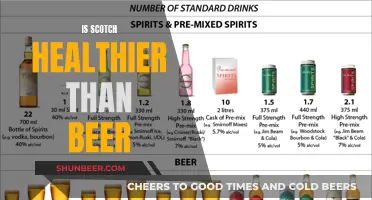
Beer has been considered one of the healthiest drinks for centuries. In modern times, research has shown that drinking beer in moderation is associated with a lower risk of cardiovascular disease and some cancers. With the growing popularity of health and fitness, many beer drinkers are now opting for low-calorie and low-carb beers. One of the most popular entrants in this category is Michelob Ultra, a part of the Anheuser-Busch family, which also includes popular brands like Budweiser and Stella Artois. Michelob Ultra is marketed as a sports drink and has been endorsed by athletes like Lance Armstrong. With only 95 calories and 2.6 grams of carbs per 12-ounce serving, it is one of the lowest-calorie beers in the market. However, it has been criticised for its watered-down taste and has received low ratings from beer enthusiasts.
What You'll Learn

Michelob Ultra's nutritional value
Beer has long been considered a healthy drink. In colonial America, for example, beer was consumed daily by everyone, including toddlers, as it was safer to drink than water, which could be contaminated. Beer was also praised by doctors of the time as a nutritious drink, so long as it was consumed in moderation.
Today, beer has more protein and B vitamins than wine, as well as plenty of healthy antioxidants. Drinking beer in moderation is associated with a lower risk of cardiovascular disease and some cancers. Hops, one of the main ingredients in beer, have also been shown to have anti-inflammatory properties.
Michelob Ultra is a light beer that was launched in 2002 as a response to the success of Bud Light. It was originally marketed towards Baby Boomers, but it accidentally gained popularity among younger, sporty audiences. It has since become one of the top-selling beers in the US, with a reputation as a "healthy" beer.
Michelob Ultra has a low-calorie count, with just 95 calories per 12-ounce serving. This is less than competitors like Bud Light (110 calories) and Coors Light (102 calories). Michelob Ultra also has a low-carb count, with 2.6 grams of carbohydrates per serving, compared to 3.2 grams in Natural Light and Busch Light.
In addition to its low-calorie and low-carb content, Michelob Ultra is also keto-friendly. The keto diet requires consuming fewer than 50 net carbs per day and encourages the body to burn fat for energy. Michelob Ultra's low-carb count fits within this diet, making it a popular choice for keto dieters.
The Michelob Ultra family has since expanded to include four beers: the original Michelob Ultra, Michelob Ultra Pure Gold (an organic version), Michelob Ultra Amber Max (a gluten-reduced version), and Michelob Ultra Infusions (with added fruit flavors).
While Michelob Ultra has been praised for its nutritional value, it's important to remember that excessive drinking can be harmful to your health. Moderation is key when it comes to enjoying the potential health benefits of beer.
Beer and Kidney Health: Exploring the Connection
You may want to see also

How does Michelob Ultra compare to other beers?
Michelob Ultra is a light beer that was launched in 2002 by Anheuser-Busch InBev. It is marketed as a sports drink and has been endorsed by athletes like Lance Armstrong and Kerri Walsh Jennings. With 95 calories and 2.6 grams of carbohydrates per 12-ounce serving, Michelob Ultra has fewer calories than competitors like Bud Light, Coors Light, and Miller Lite. It also has fewer carbs than competitors with similar calorie counts, like Natural Light and Busch Light.
Michelob Ultra was originally targeted at Baby Boomers, but it accidentally gained popularity among younger, health-conscious drinkers. It has since become one of the fastest-growing domestic beers in the US, creating its own untouchable sub-segment. The brand has expanded to include four beers: the original Michelob Ultra Superior Light Beer, Michelob Ultra Pure Gold (an organic version), Michelob Ultra Amber Max (a gluten-reduced version), and Michelob Ultra Infusions (with added fruit flavors).
Michelob Ultra is often compared to other light beers, like Bud Light, Coors Light, and Miller Lite. When compared to these competitors, Michelob Ultra has fewer calories and carbohydrates. However, some people find the taste of Michelob Ultra disappointing, describing it as "watered down."
In terms of health, Michelob Ultra's low-calorie and low-carb content may appeal to those on diets like keto. Research suggests that drinking one to two alcoholic beverages per day may be associated with a lower risk of cardiovascular disease and some cancers. However, excessive drinking can be harmful to your health. Therefore, it is important to drink in moderation.
Tequila vs Beer: Which Alcoholic Drink is Healthier?
You may want to see also

Is Michelob Ultra a good choice for health-conscious drinkers?
Michelob Ultra is a light beer that was launched in 2002 as a new beer for health-conscious drinkers, fitness enthusiasts, and athletes. It is a low-calorie, low-carb beer with 95 calories and 2.6 grams of carbohydrates per 12-ounce serving. This is lower than its closest competitors, including Bud Light, Coors Light, and Miller Lite. The beer also has a slightly lower alcohol content, with 4.2% ABV.
Michelob Ultra has been marketed as a sports drink, with ads featuring athletes such as Lance Armstrong and Kerri Walsh Jennings. It has also been described as the "Gatorade of beer". The brand has sponsored various sporting events and athletes, including the World Surf League and the Turkey Trotters.
The beer was originally targeted at Baby Boomers, with the tagline "Lose the carbs. Not the taste." However, it ended up attracting a younger, sporty audience. Michelob Ultra has since become one of the top-selling beer brands in the US, known for its active and athletic lifestyle associations.
The beer has a light, refreshing taste with a subtle citrus aroma. It is described as crisp and carbonated, giving drinkers the feeling of hydration. While some reviewers appreciate the lack of fruit flavours, others find the taste watered down and disappointing.
In terms of health, Michelob Ultra is a good choice for those conscious of their calorie and carbohydrate intake. It is lower in calories and carbs than many other beers, which can help with weight management. However, it is important to note that excessive drinking can be harmful to your health, and drinking in moderation is recommended.
Overall, Michelob Ultra is a popular choice for health-conscious drinkers, offering a light, refreshing beer with fewer calories and carbs than many of its competitors. While it may not excel in taste, it has successfully tapped into the health and wellness trend, attracting drinkers with its active lifestyle associations and low-calorie, low-carb profile.
German vs American Beer: Which is Healthier?
You may want to see also

What are the benefits of drinking beer?
Beer has been consumed for thousands of years, and while it is often viewed as a guilty pleasure, drinking it in moderation may have several health benefits.
Firstly, beer contributes to our daily nutrient intake. It contains more protein and B vitamins than wine, and has the same amount of antioxidants, although these come from different sources. Beer also has significant amounts of fibre, and is one of the few significant dietary sources of silicon, which can help prevent osteoporosis.
Secondly, drinking beer in moderation may lower your risk of diabetes. A study found that men who drank between one and six beers per week had a 21% lower risk of developing diabetes.
Thirdly, beer can benefit your heart. A study found that moderate drinkers had the slowest decline in HDL ("good" cholesterol) levels, and were therefore less likely to develop cardiovascular diseases. Another study showed that men who had suffered a heart attack and drank beer moderately were 42% less likely to die of heart disease.
Fourthly, beer may build stronger bones. A review found that moderate beer consumption increased bone density in men, possibly due to the silicon content.
Fifthly, beer may boost brain power. Silicon helps protect the brain from compounds that are thought to cause cognitive diseases, and beer is also shown to raise good cholesterol, which improves blood flow to the brain. A study by researchers at Loyola University in Chicago found that moderate beer drinkers are 23% less likely to develop Alzheimer's and dementia.
Finally, beer may reduce inflammation. Hops, an essential ingredient in beer, has been found to have anti-inflammatory properties.
However, it is important to note that these benefits only apply to light to moderate beer intake. Heavy drinking and binge drinking have the opposite effects and are associated with a higher risk of early death, alcohol dependence, depression, liver disease, weight gain, and cancers.
Brooklyn Beer: Healthy Choice or Marketing Hype?
You may want to see also

What are the downsides of drinking beer?
Beer is a popular alcoholic beverage that has been consumed for thousands of years. While drinking one or two standard beers per day may offer some health benefits, excessive consumption can lead to various negative consequences. Here are some of the downsides of drinking beer:
Increased Risk of Health Issues
Drinking beer in excess can raise your risk of developing several health issues. These include depression, weight gain, and liver disease. Heavy drinking is also associated with an increased risk of early death. According to studies, consuming more than 30 grams of alcohol per day, which is roughly the amount in two to three standard beers, can elevate your chances of liver diseases like cirrhosis.
Potential for Addiction
Alcohol has the potential to be addictive, and beer is no exception. Heavy drinking can lead to alcohol dependence and increase the risk of developing alcohol use disorder. Individuals with a family history of addiction should be particularly cautious when consuming beer or any other alcoholic beverage.
Higher Calorie Intake and Weight Gain
A standard 12-ounce beer contains around 150 calories. When consumed in large quantities, the calories in beer can contribute to weight gain. The term "beer belly" is often used to describe the extra weight that accumulates around the waist due to frequent beer consumption. Studies have confirmed a positive correlation between drinking beer and an increase in waist circumference.
Increased Cancer Risk
Research has linked any alcohol intake, including beer consumption, to an elevated risk of certain cancers. Throat and mouth cancers are among the types of cancer associated with alcohol consumption. Therefore, excessive beer drinking can increase the likelihood of developing these and other forms of cancer.
Negative Impact on Muscle Growth and Recovery
While some evidence suggests that drinking a low-alcohol beer with electrolytes can enhance rehydration, other studies have shown that alcohol can hinder muscle growth and recovery. Therefore, drinking beer after a workout may not provide the expected recovery benefits, and the negative impact on muscle growth should be considered.
In conclusion, while moderate beer consumption may offer certain health benefits, excessive drinking can lead to various negative consequences. It is important to drink in moderation and be aware of the potential downsides to make informed and healthy choices.
Hard Liquor vs Beer: Which is the Healthier Choice?
You may want to see also
Frequently asked questions
Ultra Beer is marketed as a healthy option for beer lovers. It is low on calories and has fewer carbs than its closest competitor. However, it is not a good choice in terms of taste.
Ultra Beer has just 95 calories per 12-ounce serving.
Ultra Beer has 2.6 grams of carbohydrates per serving, while its closest competitors, Natural Light and Busch Light, have 3.2 grams each.
Ultra Beer has an alcohol content of 4.2% ABV.







